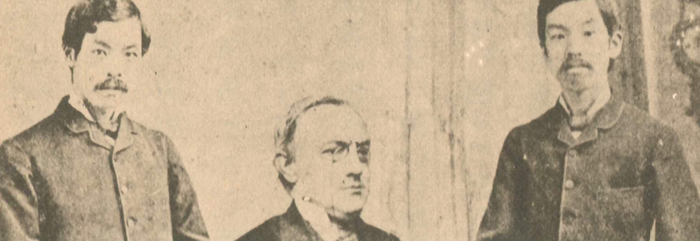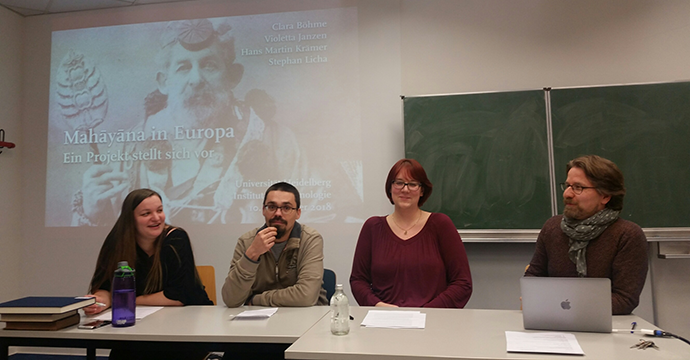Mahāyāna in Europe: Japanese Buddhists and Their Contribution to Academic Knowledge on Buddhism in Nineteenth-Century Europe

The Project
At the turn of the twentieth century, the popularity of Buddhism in Europe grew significantly. Under the influence of the life reform movement, which promoted causes such as peace, vegetarianism or animal rights, members of the urban upper classes converted to Buddhism. The appeal of Buddhism broadened through the popularisation of Zen Buddhism by D.T. Suzuki, first in America during the interwar period, and eventually in Europe after World War II.
Despite its popular appeal in the twentieth century, European knowledge about Buddhism actually can be traced back to the eighteenth century, when British, French and German indologists first gained access to Sanskrit and Pali texts. In the nineteenth century, early exposure to Buddhism reached a first peak in the philological disciplines. At the same time, the notion of ‘world religions’ began to form, and Buddhism from the beginning was counted among their number. Consequently, previous scholarship has considered ‘Buddhism’ a nineteenth century orientalist construct. Buddhism, according to this narrative, was seen as a philosophy originating with the Buddha as its founder, and later forms of Buddhism, such as those practiced in contemporary East Asia, were viewed as degenerate. Furthermore, this European ‘invention’ is said to in turn have influenced Buddhist traditions in Asia, spawning various reform movements.
In contrast to this received narrative, it has to be pointed out that already in the second half of the nineteenth century the process of the construction of ‘Buddhism’ was a global one, the protagonists of which were by no means restricted to Europeans. Especially the activities of learned Asian Buddhists in Europe had a significant influence on the scientific understanding of Buddhism. Among the earliest of these were Japanese Buddhists who travelled to Europe since the 1870s, mostly in order to study philology with prominent European orientalists, an endeavour which was to assist them in developing a scholarly understanding of their own schools’ fundamental scriptures. As a matter of fact, these Japanese ‘students’, most of whom belonged to either the Pure Land (Jōdo shū) or True Pure Land (Jōdo shinshū) school entered into a process of intense and mutual exchange with their European ‘teachers’, from which the latter did not emerge unaffected.
The most important of the Japanese Buddhist, along with their direct European mentors were:
- 1872: Shimaji Mokurai 島地黙雷 (1838–1911), with Léon de Rosny (1837–1914)
- 1876–1884: Nanjō Bun'yū 南条文雄 (1849-1927), with Friedrich Max Müller (1823–1900)
- 1876–1882: Kasahara Kenju 笠原研寿 (1852–1883), with Friedrich Max Müller
- 1880’s: Fujishima Ryōon 藤島了穏 (1852–1918), with Sylvain Lévi (1863–1935)
- 1890’s: Takakusu Junjirō 高楠順次郎 (1866–1945), with Friedrich Max Müller, Sylvain Lévi and Hermann Oldenberg (1854–1920)
- ca. 1900: Fujieda Takutsū 藤枝沢通 (1861–1920), with Sylvain Lévi
- ca. 1900: Sakaki Ryōzaburō 榊亮三郎 (1872–1946), with Sylvain Lévi
- ca. 1900: Ogiwara Unrai 荻原雲来, with Ernst Leumann (1859–1931)
- ca. 1900: Watanabe Kaigyoku 渡辺海旭, with Ernst Leumann
The aim of the present project is to offer a more nuanced and complete account of scientific knowledge of Buddhism in late nineteenth century Europe through a consideration of the direct transfer of knowledge carried out by Asian Buddhists, especially Japanese clerics. Of particular interest is the influence this Asian contribution to European knowledge about Buddhism had on the early scientific engagement with religion in Europe and, ultimately, how it impacted the scientific conceptualisation of religion as such. The project is predicated on the thesis that the way in which Japanese Buddhists presented their religion in Europe coincides with a wider trend towards the ‘spiritualisation’ or ‘interiorisation’ of religion around the turn of the twentieth century. Representatives of Asian religions were already under the influence of this trend, yet also actively participated in its amplification. The final aim of this project is thus to make a contribution towards demonstrating the great degree to which global knowledge of religion had already been entangled towards the end of the nineteenth century.
The German Research Council (DFG) has provided three years of funding for the exploration of these questions in the context of the project ‘Mahāyāna in Europe: Japanese Buddhists and Their Contribution to Academic Knowledge about Buddhism in Nineteenth-Century Europe’, based at the Department of Japanese Studies at the University of Heidelberg. For the duration of the project from April 2017 until March 2020 a team of three main investigators and research assistants will systematically pursue the question of the contributions made by Japanese Buddhists to European knowledge about Buddhism before 1900.
Introduction of the Team

- Responsible for: early Buddhist studies, Oriental studies, Religious studies in Europe and their sources, especially the reception by Western scholars of publications written by Japanese Buddhists
- 2016 M.A. Religious Studies with minor in Medieval and Modern History, University of Göttingen
- M.A. thesis title: “Religious Policy in the Meiji Era: Shintō and Buddhism”
- Responsible for: early Buddhist studies, Oriental studies, Religious studies in Europe and their sources, especially the reception by Western scholars of publications written by Japanese Buddhists
- 2012 M.A. Religious Studies with minor in Indian Studies, University of Heidelberg
- M.A. thesis title: “Saiva-Siddhanta and Western Esotericism in the late 19th and early 20th Century. The Reception of Theosophy in the Siddhanta Deepika Journal”
- Topic of doctoral thesis: “Western Occultists and Indian Masters: The Influence of A.P. Sinnett on the Discourse on Esoterics in late 19th Century India”
- Student assistant
- Graduate student in Japanese Studies with minor in Transcultural Studies, University of Heidelberg
- 2016 B.A. East Asian Studies with focus on Japanese Studies and minor in History, University of Heidelberg
- B.A. thesis title: “The Yoshiwara as a Constructed ‘Dream World’ and its Adaptation to Changes in Edo Society”
- Responsible for: direct contacts between Japanese Buddhists and European scholars, overall concept of the project
- Professor for Japanese Studies (focus History/Society), University of Heidelberg
- Professorial dissertation (2012) published as: “Shimaji Mokurai and the Reconception of Religion and the Secular in Modern Japan”
- Responsible for: development of the discourse on Buddhism in Meiji period Japan and its sources, especially periodicals
- 2012 PhD Buddhist Studies, School of Oriental and African Studies, University of London
- Dissertation title: “The Imperfectible Body: Esoteric Transmissions in Medieval Sōtō Zen Buddhism”
- Student assistant
- PhD candidate at the Heidelberg Center for Transcultural Studies
- 2018 M.A. Japanese Studies with minor in Political Studies, University of Heidelberg
- M.A. thesis title: “‘O-kuni no tame’? Japanese ‘Comfort Women’, the Forgotten Victims of the Pacific War”
Activities
- Presentation Krämer, 15 November 2014, ‘Bringing the Pure Land to Europe: Max Müller and His Japanese Interlocutors’ (Workshop Friedrich Max Müller and His Asian Interlocutors: Academic Knowledge about ‘Oriental Religions’ in Late Nineteenth-Century Europe, Heidelberg)
- Presentation Krämer, 29 January 2015, ‘Mahāyāna in Europe: The Transcultural Construction of the Concept of Religion in Nineteenth-Century European Scholarship on East Asian Buddhism’ (Heidelberg Center for Transcultural Studies Dinner Talk, Heidelberg)
- Presentation Krämer, 29 January 2016, ‘Orientalism and the Study of Lived Religions: The Case of Studies of Japan, 1870s to 1890s’ (Conference Scholarly Personae in the History of Orientalism, 1870–1930, Leiden)
- Presentation Krämer, 3 June 2016, ‘Europäisches Wissen über japanische Religionen vor 1920’ (Heidelberg-Tübingen Japan Workshop, Heidelberg)
- Workshop in Heidelberg on 3/4 November 2017
- Micah Auerback, „Seminaries of the Jōdo Shinshū in Early Meiji Japan“
- Orion Klautau, „Guiding a Great Vehicle: The Mahāyāna and Buddhist Studies in Meiji Japan“
- Mick Deneckere, „Ishikawa Shuntai’s Introduction of the Concept of ‘science de religion’“
- John Harding, „The Reception of Japanese Buddhism in North America before 1900“
- Roland Lardinois, „Sylvain Lévi and the Configuration of Indo-Chinese Studies in France ca. 1900“
- Martin Baumann, „The Reception of Theravada Buddhism in Europe in the Long Nineteenth Century“
- Hans Martin Krämer, „The ‚Spiritualization‘ of Religion Around 1900 and Japanese Buddhism“
- Lecture Licha, 8 December 2017, ‘Mahāyāna in Europe: Japanese Buddhists and Their Contribution to Academic Knowledge on Buddhism in Nineteenth-Century Europe’ (Conference 明治仏教の国際化に関する共同研究への展望, Kyōto)
- Presentation Krämer, 23 February 2018, ‘Faith/Belief as Identity Marker for Buddhism in Modern Japan’ (Workshop From Trustworthiness to Secular Beliefs – Changing Concepts of xin 信 from Traditional to Modern Chinese, Berlin)
- Presentation Krämer, 8 June 2018, ‘Mahāyāna in Europa. Der Beitrag japanischer Buddhisten zum wissenschaftlichen Wissen über Buddhismus und dem Verständnis von Religion in Europa vor 1900’ (Tagung des Promotionskollegs Globale Religionsgeschichte aus regionaler Perspektive. Eine Übersicht über die zweite Hälfte des 19. Jahrhunderts (ca. 1850–1914), Heidelberg)
- Presentation Krämer, 19 July 2018, ‘’Even Three-Year-Old Children Know that the Source of Enlightenment Is not Religion but Science’: Modern Japanese Buddhism between ‘Religion’ and ‘Science’, 1860s–1910s’ (Conference Secularities in Japan, Leipzig)
- Panel ‘Mahāyāna in Europe – Japanese Buddhists and their Contribution to Academic Knowledge on Buddhism in Nineteenth-Century Europe’ at the Annual Conference of the British Association for Japanese Studies in Sheffield on 6 September 2018
- Stephan Kigensan Licha, „Naturalising Enlightenment – Buddhist Legitimisation Strategies in Early Meiji Japan“
- Hans Martin Krämer, „19th Century European Orientalists and Their Japanese Interlocutors“
- Ulrich Harlass, „The Discovery of Japanese Buddhism as Part of the World Religion ‚Buddhism‘?“
- Presentation Krämer, 26 October 2018, 近代日本仏教の西洋的起源―19世紀における日欧交流史の一側面 (‘The Western Origins of Modern Japanese Buddhism – An Aspect of the History of Exchange between Japan and Europe in the 19th Century’) (Nichi Doku Joint Lecture Series, Kyōto)
- Presentation Krämer, 2 November 2018, 19世紀グローバル宗教史の中の日本仏教―近代的挑戦と浄土真宗― (‘Japanese Buddhism within the Global History of Religion in the 19th Century – The Jōdo Shinshū and Modern Challenges’) (Workshop 日本仏教と西洋/世界の19世紀―真宗僧侶を中心として―, Kyōto)
- Presentation by all project members, 10 December 2018, ‘Mahayana in Europa – a project introduces itself’ (Institute for Japanese Studies, Heidelberg)
Publications
- Krämer, Hans Martin. ‘Orientalism and the Study of Lived Religions: The Japanese Contribution to European Models of Scholarship on Japan Around 1900’. In: Christiaan Engberts und Hermann Paul (Hrsg.): Scholarly Personae in the History of Orientalism, 1870–1930. Forthcoming from Brill.

